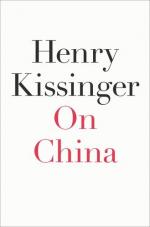|
This section contains 470 words (approx. 2 pages at 400 words per page) |

|
On China Summary & Study Guide Description
On China Summary & Study Guide includes comprehensive information and analysis to help you understand the book. This study guide contains the following sections:
This detailed literature summary also contains Topics for Discussion and a Free Quiz on On China by Henry Kissinger.
On China by Henry A. Kissinger is a book of non-fiction that details the statesman's account of the history of China and the US-Sino relationship on a political level.
The preface to On China begins with an explanation of Henry Kissinger's role in the U.S. government and his relationship with the Chinese people and their government. Kissinger presents an insider's view into the occurrences that took place at that time. Kissinger also states that the primary focus of the book is to record the interaction between the Chinese and American governments since 1949 when the People's Republic of China was established. Kissinger has kept records of his conversations with high level Chinese officials and using those notes was able to create this book.
"Forty years ago almost to the day, President Richard Nixon did me the honor of sending me to Beijing to reestablish contact with a country central to the history of Asia with which America had had no high-level contact for over twenty years. The American motive for the opening was to put before our people a vision of peace transcending the travail of the Vietnam War and the ominous vistas of the Cold War." (Preface, p. 11)
Kissinger addresses the long and illustrious history of China, beginning with the prologue.
In 1962, there was a stand off between China and India regarding their common borders. Each seemed to have a valid argument over the rights. China's revolutionary leader Mao Zedong called his highest ranking military and political officers to meet with him in Beijing. Meanwhile, Chinese and Indian troops were engaged in a stalemate. Kissinger explains how and why Mao broke the stalemate. China attacked and conquered the Indians.
The author explains the basic history of Chinese government.
China is different from most other countries due to its spiritual and political philosophies.
"Societies and nations tend to think of themselves as eternal. They also cherish a tale of their origin." (Chap. 1, p. 20)
Kissinger believes that this statement represents China more than any other. China is one place that seems to have existed since the dawn of time. The supposed founder of China, the Yellow Emperor, is highly revered. However, myth suggests that the Yellow Emperor was responsible for re-establishing China, not creating it. China had fallen into chaos and required a new emperor, so the Yellow Emperor stepped forward to take control.
The majority of the text regarding the government centers around Mao Zedong and Deng Xiaoping. Mao sought to tear down the ancient culture and strengthen it politically. Deng sought to modernize the country after Mao left it in ruins.
Kissinger was part of an elite team that reestablished US-Sino relations. The author details the relationships between the US and China from the birth of the People's Republic of China in 1949 to present day.
Read more from the Study Guide
|
This section contains 470 words (approx. 2 pages at 400 words per page) |

|



